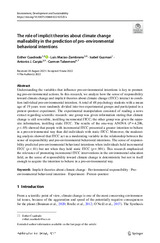The role of implicit theories about climate change malleability in the prediction of pro-environmental behavioral intentions
Autor
Cuadrado, Esther
Macias-Zambrano, Luis
Guzmán, Isabel
Carpio, Antonio J.
Tabernero Urbieta, Carmen
Editor
SpringerFecha
2022Materia
Implicit theories about climate changeEnvironmental responsibility
Pro-environmental behavioral intention
Experiment
Pretest–posttest
METS:
Mostrar el registro METSPREMIS:
Mostrar el registro PREMISMetadatos
Mostrar el registro completo del ítemResumen
Understanding the variables that influence pro-environmental intentions is key to promoting pro-environmental actions. In this research, we analyze how the sense of responsibility toward climate change and implicit theories about climate change (ITCC) interact to condition individual pro-environmental intention. A total of 48 psychology students with a mean age of 19 years were randomly divided into two experimental groups and participated in a pretest–posttest experiment. The experimental manipulation consisted of reading a news extract regarding scientific research: one group was given information stating that climate change is still reversible, instilling incremental ITCC; the other group was given the opposite information, instilling static ITCC. The results of the one-way ANOVA (F = 4.206, p < .05) showed that people with incremental ITCC presented a greater intention to behave in a pro-environmental way than did individuals with static ITCC. Moreover, the moderating analysis showed that ITCC act as a moderating variable in the relationship between the sense of responsibility and pro-environmental behavioral intentions. The sense of responsibility predicted pro-environmental behavioral intentions when individuals held incremental ITCC (p < .01) but not when they held static ITCC (p = .901). This research emphasized the relevance of promoting incremental ITCC interventions in the environmental education field, as the sense of responsibility toward climate change is deterministic but not in itself enough to acquire the intention to behave in a pro-environmental way.

